Nurses Narratives Margaret Aitken
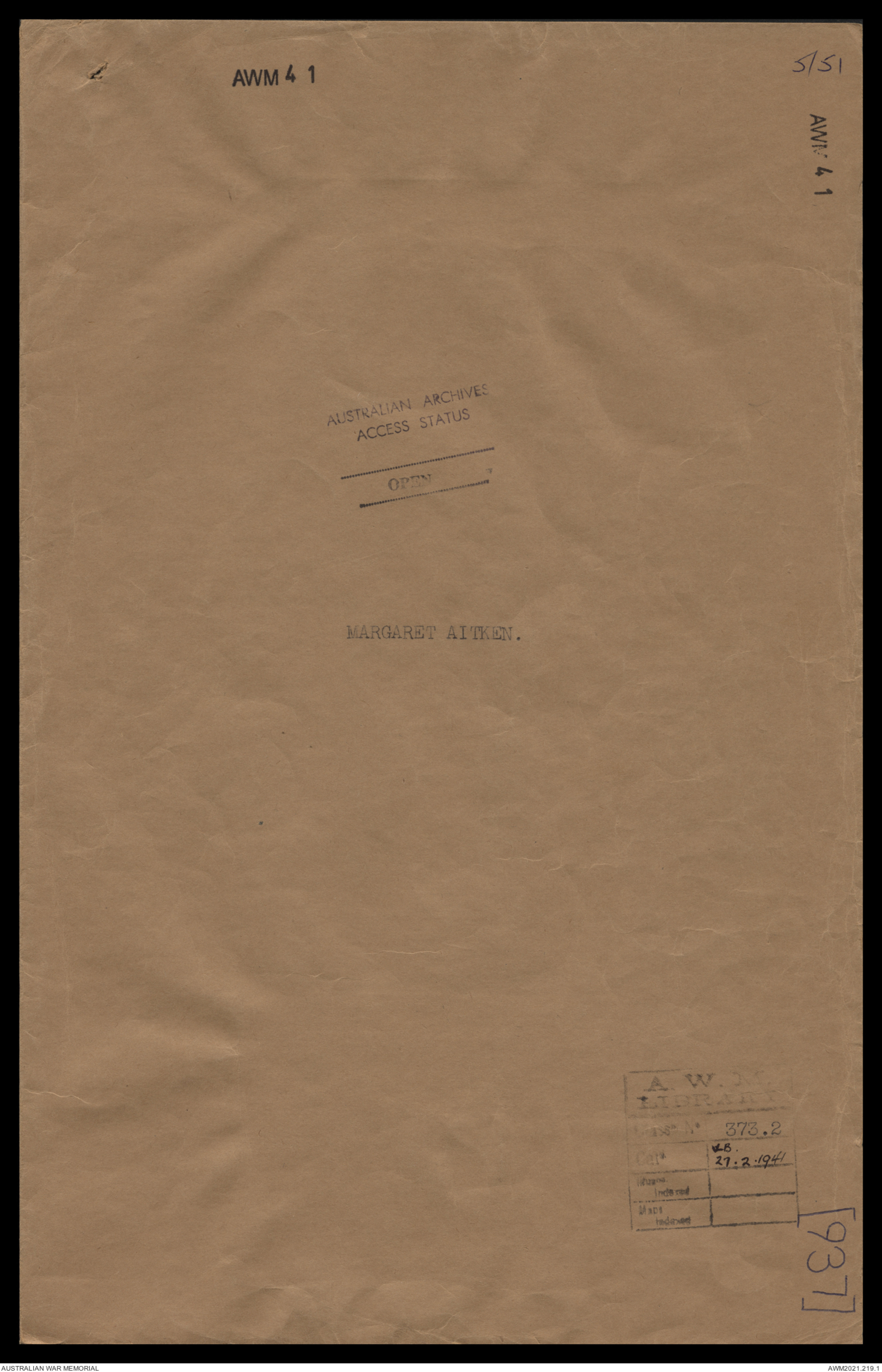
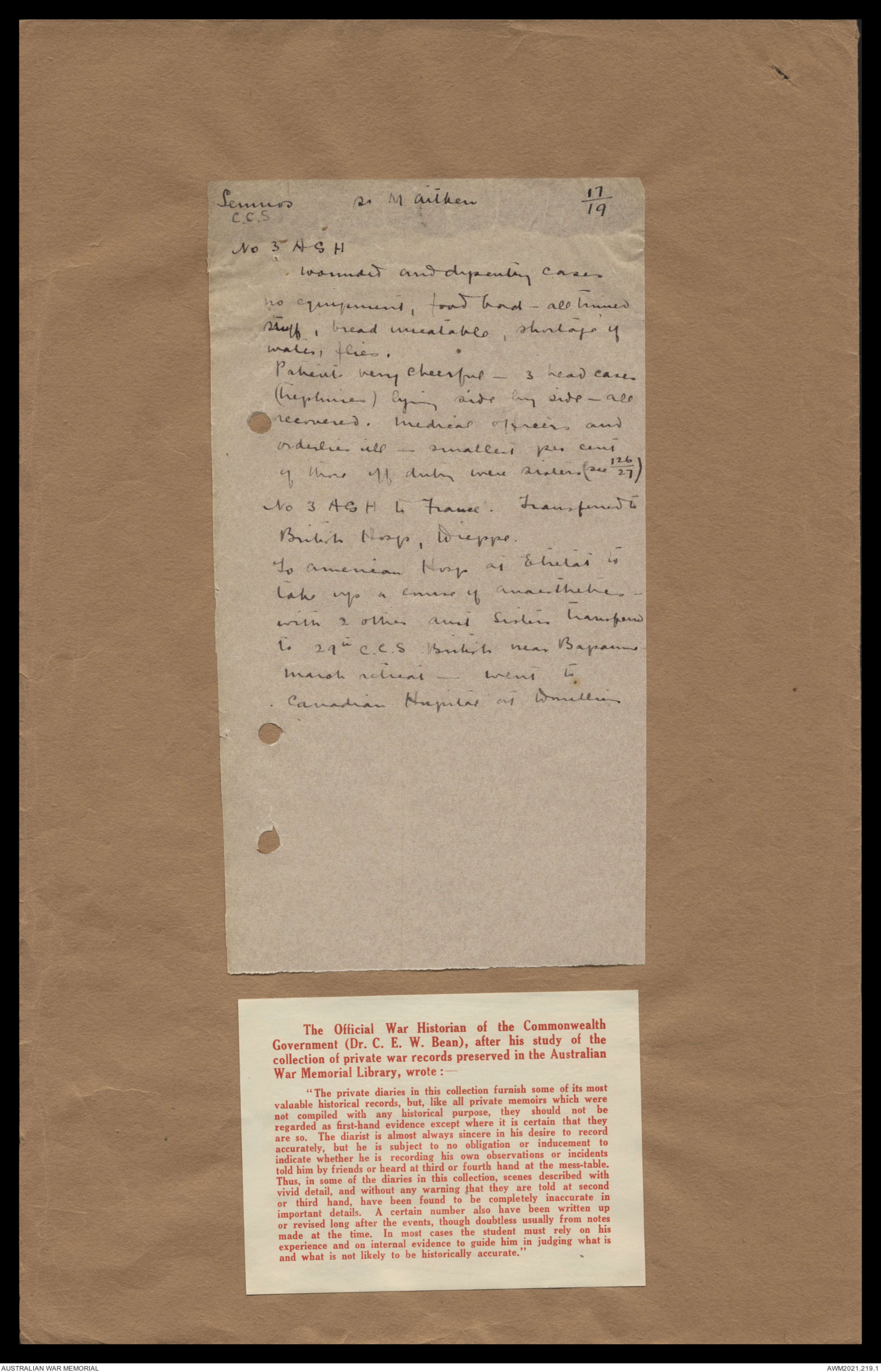
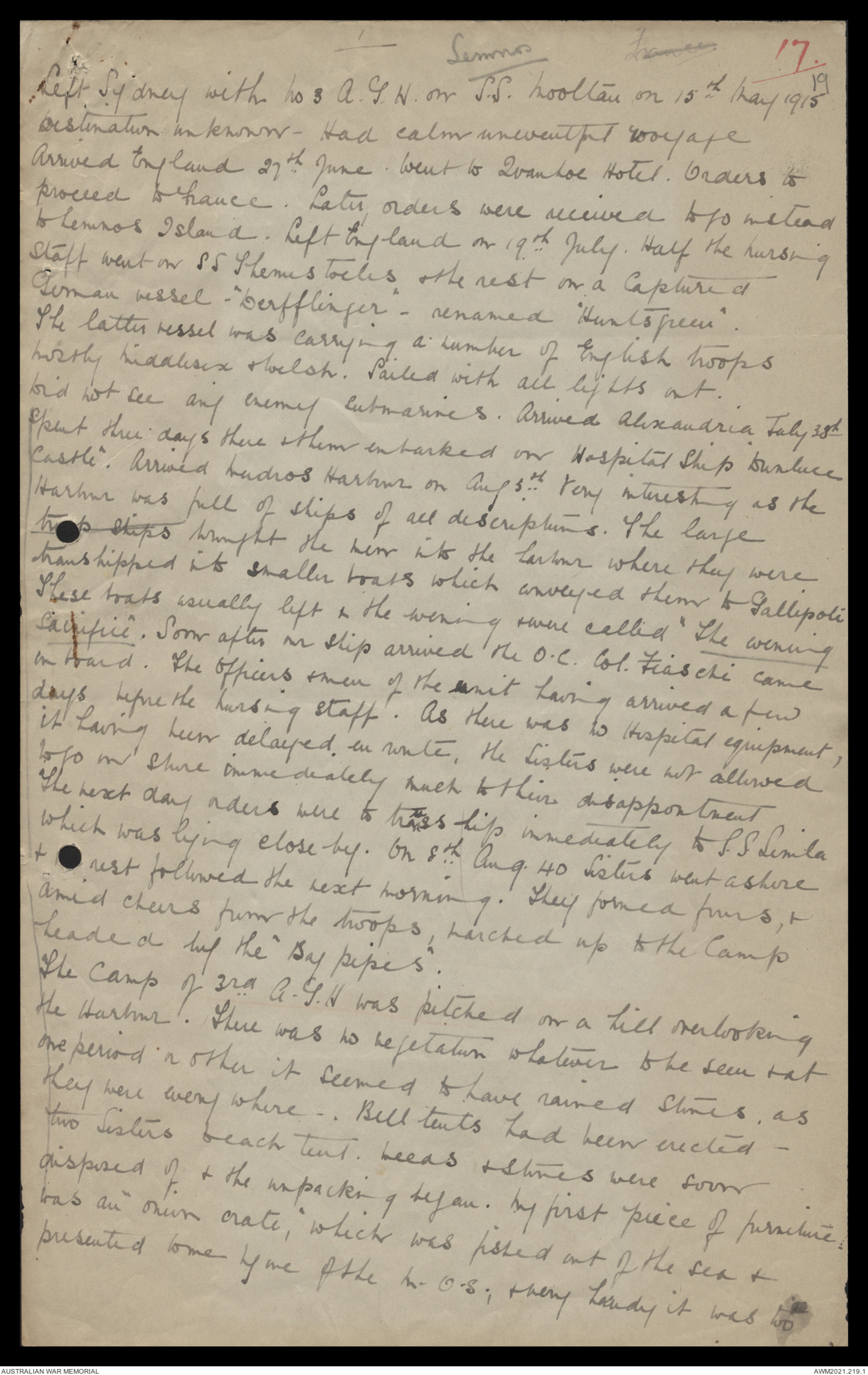
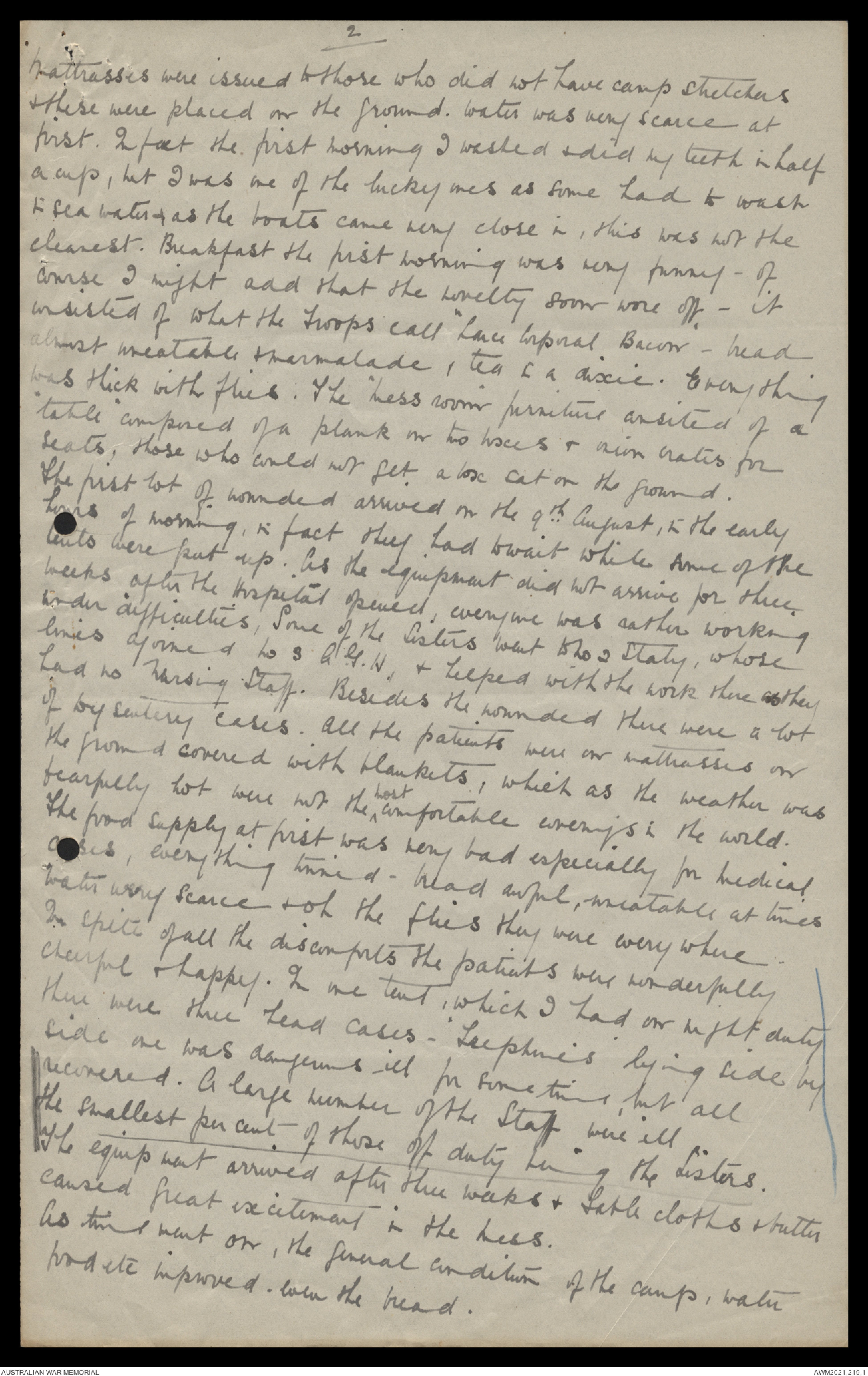
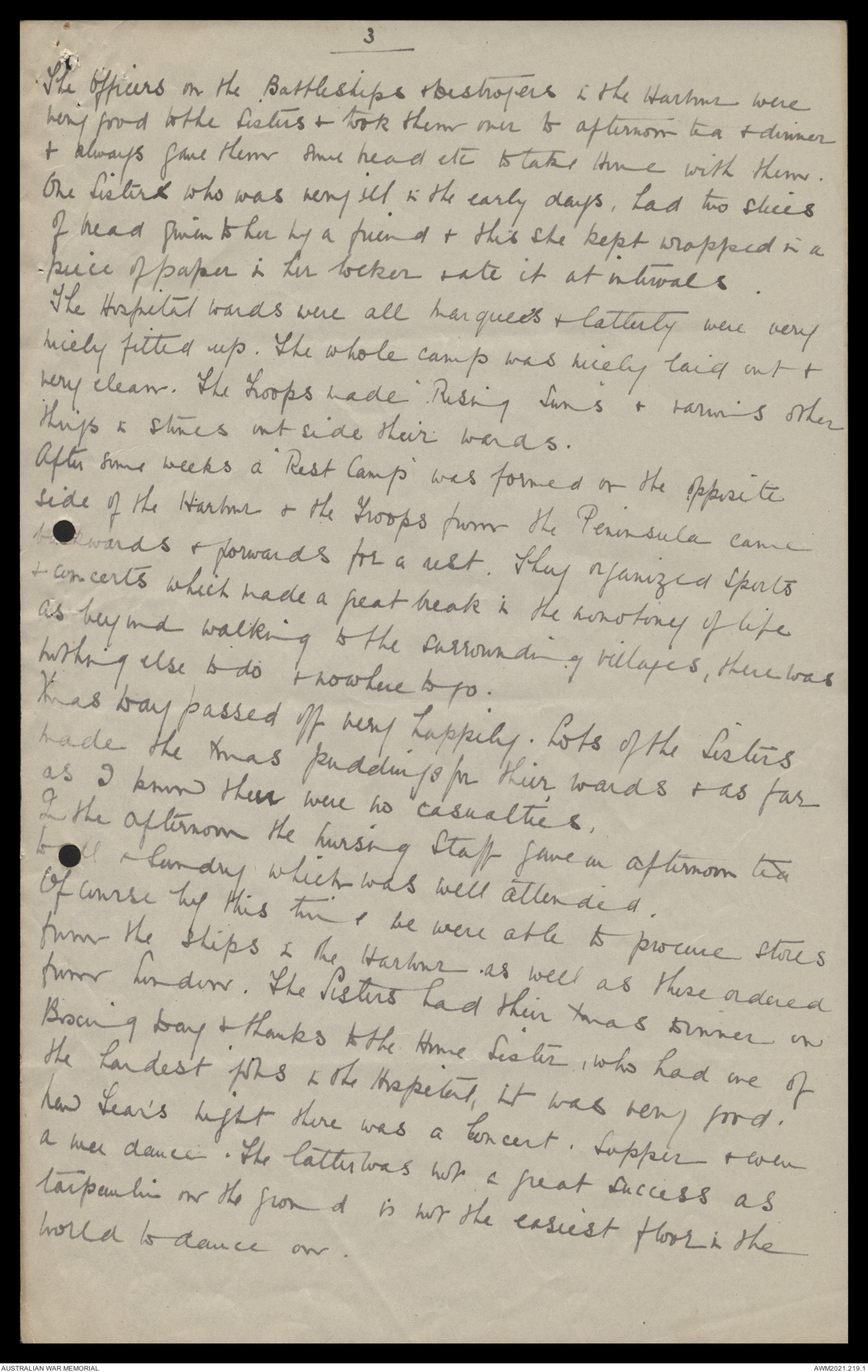
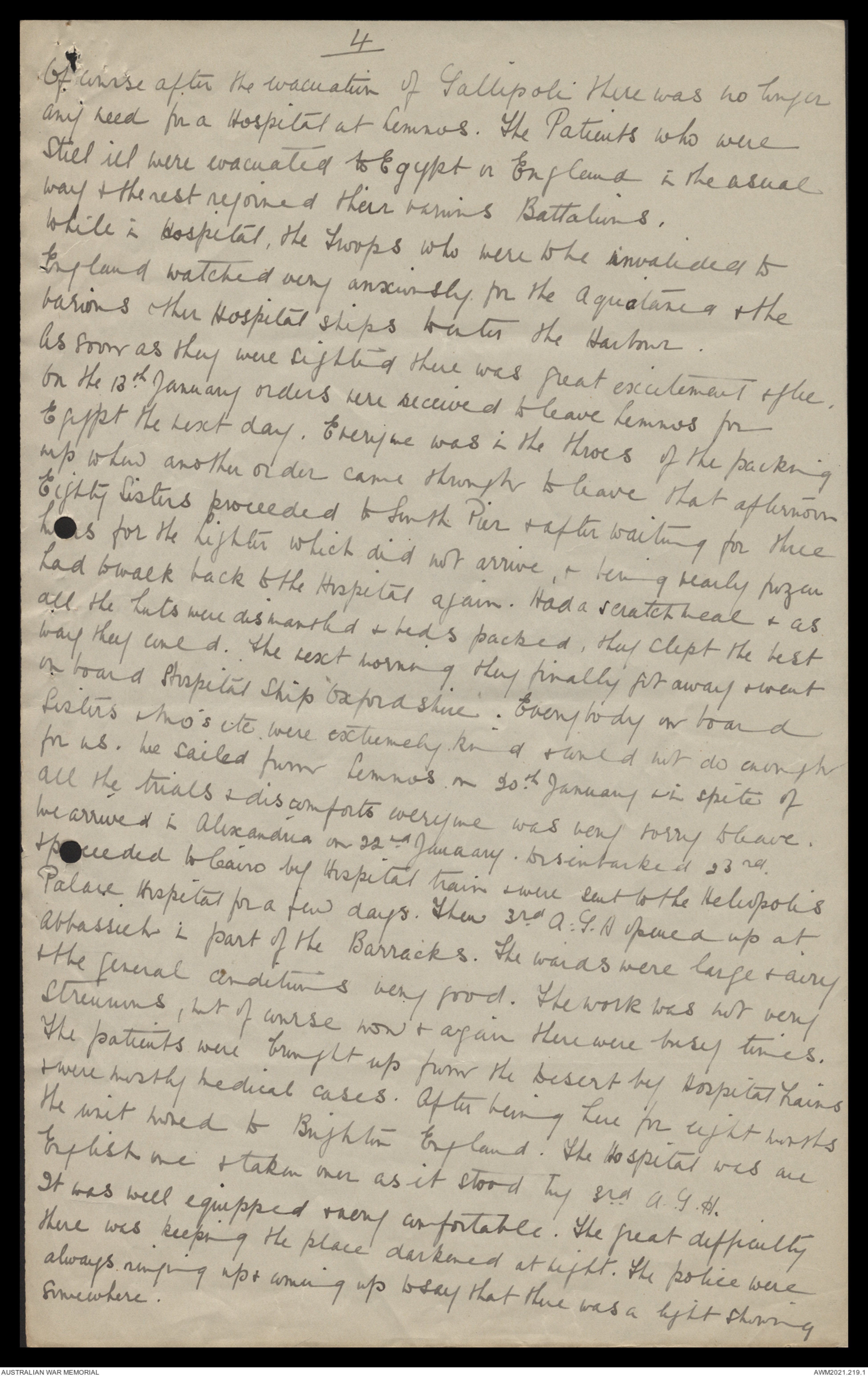
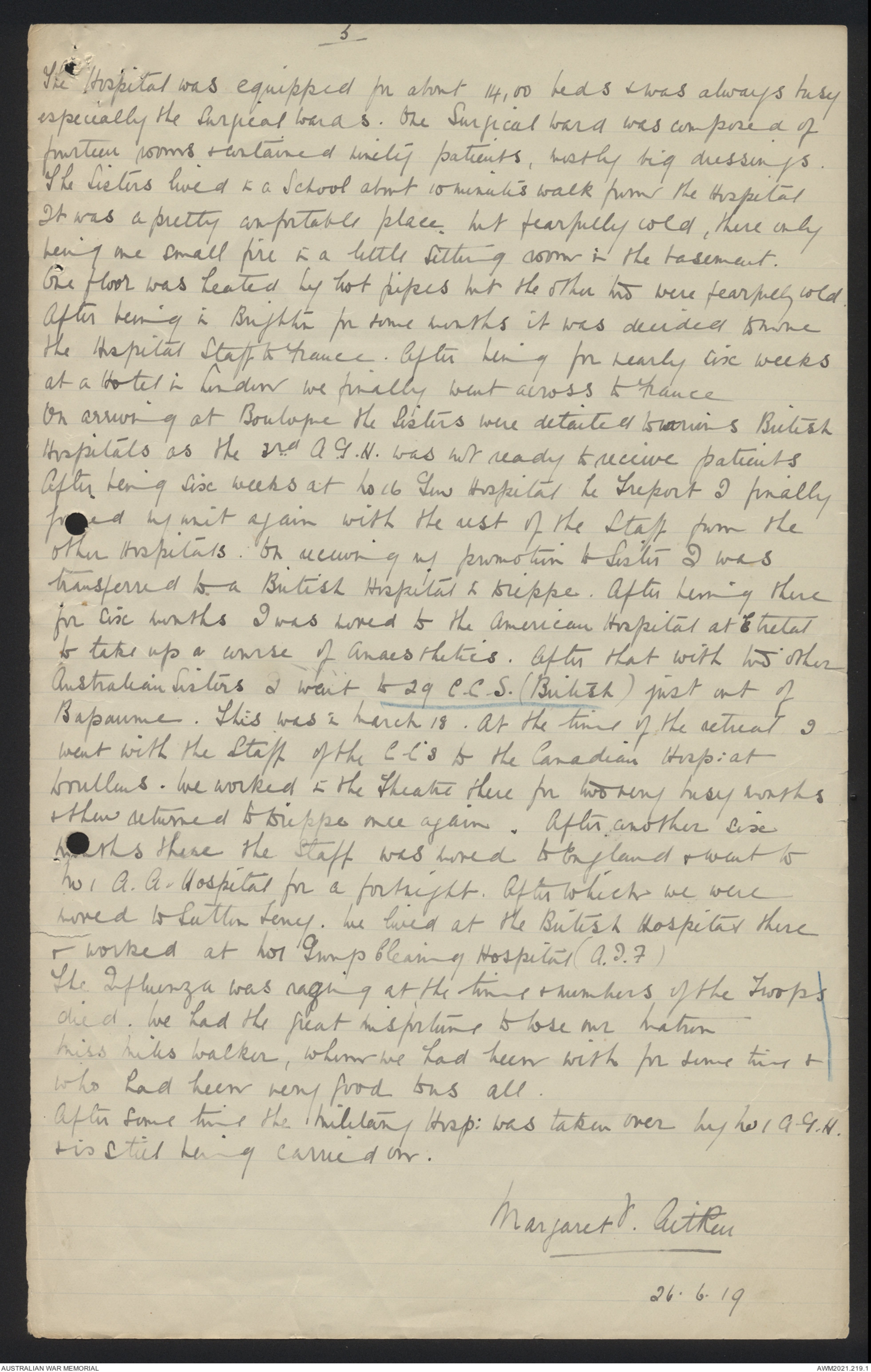
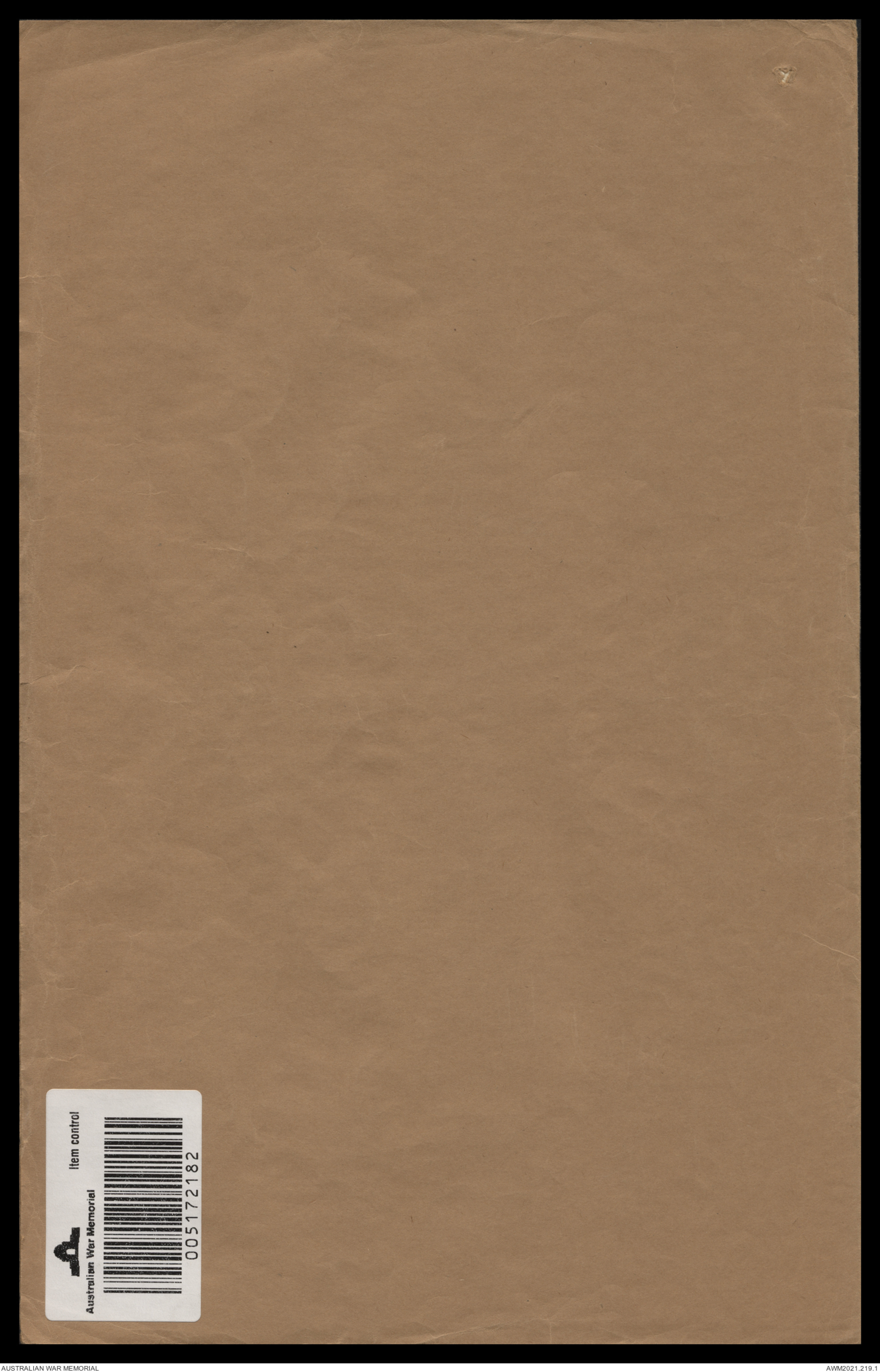
AWM 4 1
5/51
AWM 4 1
AUSTRALIAN ARCHIVES
ACCESS STATUS
OPEN
MARGARET AITKEN.
AWM
LIBRARY
CLASSN No 373.2
CATy VB. 27.2.1941
[937]
Lemnos
C.C.S.
Sr M Aitken
17/19
No 3 AGH
Wounded and dysentery cases
no equipment, food bad, all tinned
stuff, bread uneatable, shortage of
water, flies.
Patients very cheerful - 3 head cases
(trephines) lying side by side - all
recovered. Medical officers and
orderlies ill - smallest per cent
of those off duty were sisters (see 126/27)
No 3 AGH to France. Transported to
British Hosp, Dieppe.
To American Hosp at Etretat to
take up a course of anaesthetics -
with 2 other Aust Sisters transferred
to 29th C.C.S. British near Bapaume
March retreat - went to
Canadian Hospital at Doullens
The Official War Historian of the Commonwealth
Government (Dr. C. E. W. Bean), after his study of the
collection of private war records preserved in the Australian
War Memorial Library, wrote:-
"The private diaries in this collection furnish some of its most
valuable historical records, but, like all private memoirs which were
not compiled with any historical purpose, they should not be
regarded as first-hand evidence except where it is certain that they
are so. The diarist is almost always sincere in his desire to record
accurately, but he is subject to no obligation or inducement to
indicate whether he is recording his own observations or incidents
told him by friends or heard at third or fourth hand at the mess-table.
Thus, in some of the diaries in this collection, scenes described with
vivid detail, and without any warning that they are told at second
or third hand, have been found to be completely inaccurate in
important details. A certain number also have been written up
or revised long after the events, though doubtless usually from notes
made at the time. In most cases the student must rely on his
experience and on internal evidence to guide him in judging what is
and what is not likely to be historically accurate."
1
LemnosFrance
17. 19
Left Sydney with No 3 A.G.H. on S.S. Mooltan on 15th May 1915
Destination unknown - Had calm uneventful voyage
Arrived England 27th June. Went to Ivanhoe Hotel. Orders to
proceed to France. Later orders were received to go instead
to Lemnos Island. Left England on 19th July. Half the Nursing
Staff went on SS Themistocles & the rest on a Captured
German vessel - "Derfflinger", renamed "Huntsgreen".
The latter vessel was carrying a number of English troops
mostly Middlesex & Welsh. Sailed with all lights out.
Did not see any enemy submarines. Arrived Alexandria July 30th.
Spent three days there & then embarked on Hospital Ship "Dunluce
Castle". Arrived Mudros Harbour on Aug 5th Very interesting as the
Harbour was full of ships of all descriptions. The large
troop ships brought the men into the harbour where they were
transhipped into smaller boats which conveyed them to Gallipoli.
These boats usually left in the evening & were called "The evening
Sacrifice". Soon after our ship arrived the O.C. Col. Fiaschi came
on board. The Officers & men of the unit having arrived a few
days before the nursing staff. As there was no Hospital equipment,
it having been delayed en route, the Sisters were not allowed
to go on shore immediately much to their disappointment
The next day orders were to tra^nsship immediately to S.S. Simla
which was lying close by. On 8th Aug. 40 Sisters went ashore
& x rest followed the next morning. They formed fours, &
amid cheers from the troops, marched up to the Camp
headed by the "Bag pipes".
The Camp of 3rd A.G.H. was pitched on a hill overlooking
the Harbour. There was no vegetation whatever to be seen & at
one period or other it seemed to have rained stones, as
they were every where. Bell tents had been erected -
two Sisters to each tent. Weeds & stones were soon
disposed of & the unpacking began. My first piece of furniture
was an "onion crate," which was fished out of the sea &
presented to me by one of the M.O.S., & very handy it was too
2
Mattresses were issued to those who did not have camp stretchers
& these were placed on the ground. Water was very scarce at
first. In fact the first morning I washed and did my teeth in half
a cup, but I was one of the lucky ones as some had to wash
in sea water & as the boats came very close in, this was not the
cleanest. Breakfast the first morning was very funny - of
course I might add that the novelty soon wore off - it
consisted of what the Troops call "Lance Corporal Bacon" - bread
almost uneatable & marmalade, tea & a dixie. Everything
was thick with flies. The "Mess room" furniture consisted of a
"table" comprised of a plank on two boxes & onion crates for
seats, those who could not get a box sat on the ground.
The first lot of wounded arrived on the 9th August, in the early
hours of morning, in fact they had to wait while some of the
tents were put up. As the equipment did not arrive for three
weeks after the Hospital opened, everyone was rather working
under difficulties. Some of the Sisters went to No 2 Staty, whose
lines adjoined No 3 A.G.H., & helped with the work there as they
had no Nursing Staff. Besides the wounded there were a lot
of Dysentery cases. All the patients were on mattresses on
the ground covered with blankets, which as the weather was
fearfully hot were not the ^most comfortable coverings in the world.
The food supply at first was very bad especially for medical
cxses, everything tinned - bread awful, uneatable, at times
water very scarce & oh the flies they were every where.
In spite of all the discomforts the patients were wonderfully
cheerful & happy. In one tent, which I had on night duty
there were three head cases - "Trephines" lying side by
side one was dangerous ill for some time, but all
recovered. A large number of the Staff were ill.
The smallest per cent of those off duty being the Sisters.
The equipment arrived after three weeks & table cloths & butter
caused great excitement in the Mess.
As time went on, the general condition of the camp, water
food etc improved - even the bread.
3
The Officers on the Battleships & Destroyers in the Harbour were
very good to the Sisters & took them over to afternoon tea & dinner
& always gave them some bread etc to take home with them.
One Sisters who was very ill in the early days, had two slices
of bread given to her by a friend & this she kept wrapped in a
piece of paper in her locker & ate it at intervals.
The Hospital wards were all Marquee's & latterly were very
nicely fitted up. The whole camp was nicely laid out &
very clean. The Troops made "Rising Suns" & various other
things & stones outside their wards.
After some weeks a "Rest Camp" was formed on the opposite
side of the Harbour & the Troops from the Peninsula came
backwards & forwards for a rest. They organized Sports
& concerts which made a great break in the monotony of life
as beyond walking to the surrounding villages, there was
nothing else to do & nowhere to go.
Xmas Day passed off very happily. Lots of the Sisters
made the Xmas puddings for their wards & as far
as I know there were no casualties.
In the afternoon the Nursing Staff gave an afternoon tea
to xll & sundry which was well attended.
Of course by this time we were able to procure stores
from the ships in the Harbour as well as those ordered
from London. The Sisters had their Xmas Dinner on
Boxing Day & thanks to the Home Sister, who had one of
the hardest jobs in the Hospital, it was very good.
New Year's night there was a Concert, Supper & even
a nice dance. The latter was not a great success as
tarpaulin on the ground is not the easiest floor in the
world to dance on.
4
Of course after the evacuation of Gallipoli there was no longer
any need for a Hospital at Lemnos. The Patients who were
still ill were evacuated to Egypt or England in the usual
way & the rest rejoined their various Battalions.
While in Hospital, the Troops who were to be invalided to
England watched very anxiously for the Acquitania & the
various other Hospital ships to enter the Harbour.
As soon as they were sighted there was great excitement & glee.
On the 13th January orders were received to leave Lemnos for
Egypt the next day. Everyone was in the throes of the packing
up when another order came through to leave that afternoon
Eighty Sisters proceeded to South Pier & after waiting for three
hxs for the Lighter which did not arrive, & being nearly frozen
had to walk back to the Hospital again. Had a scratch meal & as
all the tents were dismantled & beds packed, they slept the best
way they could. The next morning they finally got away & went
on board Hospital Ship "Oxfordshire". Everybody on board
Sisters & MO's etc. were extremely kind & could not do enough
for us. We sailed from Lemnos on 20th January in spite of
all the trials & discomforts everyone was very sorry to leave.
We arrived in Alexandria on 22nd January. Disembarked 23rd
& proceeded to Cairo by Hospital train & were sent to the Heliopolis
Palace Hospital for a few days. Then 3rd A.G.H. opened up at
Abbassieh in part of the Barracks. The wards were large & airy
& the general conditions very good. The work was not very
strenuous, but of course now & again there were busy times.
The patients were brought up from the Desert by Hospital Trains
& were mostly medical cases. After being here for eight months
the unit moved to Brighton England. The Hospital was an
English one & taken over as it stood by 3rd A.G.H.
It was well equipped & very comfortable. The great difficulty
there was keeping the place darkened at night. The police were
always ringing up & coming up to say that there was a light showing
somewhere.
5
The Hospital was equipped for about 14,00 beds & was always busy
especially the Surgical Wards. One Surgical Ward was composed of
fourteen rooms & contained ninety patients, mostly big dressings.
The Sisters lived in a School almost 10 minutes walk from the Hospital
It was a pretty comfortable place, but fearfully cold, there only
being one small fire in a little sitting room in the basement.
One floor was heated by hot pipes but the other two were fearfully cold.
After being in Brighton for some months it was decided to move
the Hospital Staff to France. After being for nearly six weeks
at a Hotel in London we finally went across to France
On arriving at Boulogne the Sisters were detailed to various British
Hospitals as the 3rd A.G.H was not ready to receive patients
After being six weeks at No. 16 Gen Hospital Le Treport I finally
fxxnd my unit again with the rest of the Staff from the
other Hospitals. On receiving my promotion to Sister I was
transferred to a British Hospital in Dieppe. After being there
for six months I was moved to the American Hospital at Etretat
to take up a course of Anaesthetics. After that with two other
Australian Sisters I went to 29 C.C.S. (British) just out of
Bapaume. This was in March 18. At the time of the retreat I
went with the Staff of the CCS to the Canadian Hosp: at
Doullens - We worked in the Theatre there for two very busy months
& then returned to Dieppe once again. After another six
mxxths there the Staff was moved to England & went to
No 1 A.A. Hospital for a fortnight. After which we were
moved to Sutton Veny. We lived at the British Hospital there
& worked at No 1 Imp Clearing Hospital (A.I.F)
The Influenza was raging at the time & numbers of the Troops
died. We had the great misfortune to lose our Matron
Miss Miles Walker, whom we had been with for some time &
who had been very good to us all.
After some time the Military Hosp: was taken over by No 1 A.G.H
& is still being carried on.
Margaret J. Aitken
26.6.19
Item control
Australian War Memorial
005172182
 Marisa Bortolotto
Marisa BortolottoThis transcription item is now locked to you for editing. To release the lock either Save your changes or Cancel.
This lock will be automatically released after 60 minutes of inactivity.